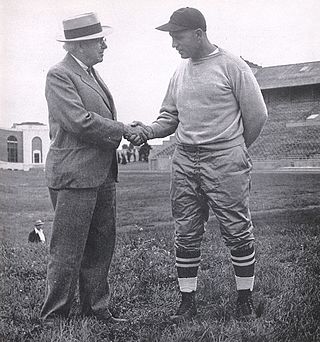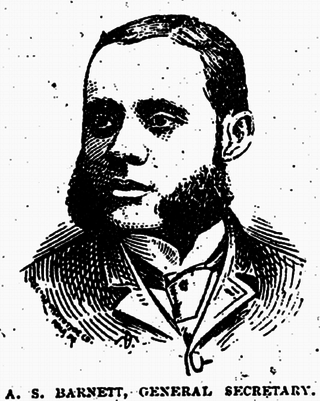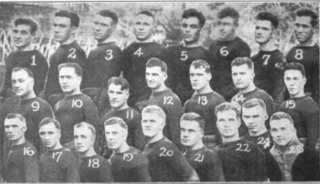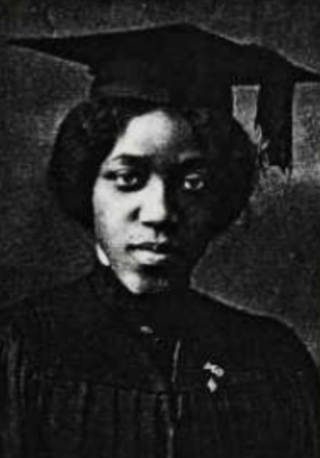The Western League was the name of several American sports leagues in Minor League Baseball. This article concentrates on the Western Leagues that operated from 1900 to 1937 and from 1947 to 1958.

Charles Sumner "Cy" Sherman was an American journalist and is known as the "father of the Cornhuskers" after giving the University of Nebraska football team the name "Cornhuskers" in 1899. At his suggestion in 1936, Associated Press (AP) sports editor Alan J. Gould created the first AP Poll for ranking college football teams. Sherman began his career writing at the Nebraska State Journal in Lincoln, spent a short time at the Red Lodge, Montana Pickett before returning to Lincoln and the Lincoln Star where he spent most of his career. At his death he was called by the Star the "Dean of American Sportswriters".
Harrison J. Pinkett was a journalist and civil rights activist in Washington DC and then a lawyer in Omaha, Nebraska. As a journalist, he was the head of the so-called "Press Bureau" and often used the bureau's collective pen name, "P.S. Twister". In 1907, at the recommendation of friends in the NAACP, he moved to Omaha where he frequently worked in civil rights. He served as a first lieutenant in the 92nd Infantry Division in World War I and frequently defended the rights of black soldiers.
Thomas P. Mahammitt was a journalist, caterer, civil rights activist, and civic leader from Omaha Nebraska. He was owner and editor for the black weekly, The Enterprise, Omaha's leading black paper at the turn of the 20th century. He was also an active leader in the Masons and the Boy Scouts and was named "Omaha's most distinguished Negro citizen" in 1934.

Ella Lillian Davis Browne Mahammitt was an American journalist, civil rights activist, and women's rights activist from Omaha, Nebraska. She was editor of the black weekly newspaper The Enterprise, president of Omaha's Colored Women's Club, and an officer of local branches of the Afro-American League. In 1895, she was vice-president of the National Federation of Afro-American Women, headed by Margaret James Murray, and in 1896 was a committee member of the successor organization, the National Association of Colored Women, under president Mary Church Terrell.

Edwin R. Overall aka Edwin R. Williams was an abolitionist, civil rights activist, civil servant, and politician in Chicago and Omaha. In the 1850s and 1860s, he was involved in abolition and underground railroad activities headed at Chicago's Quinn Chapel AME Church. During the U. S. Civil War, he recruited blacks in Chicago to join the Union Army. After the war, he moved to Omaha, where he was involved in the founding of the National Afro-American League and a local branch of the same. He was the first black in Nebraska to be nominated to the state legislature in 1890. He lost the election, but in 1892, his friend Matthew O. Ricketts became the first African-American elected to the Nebraska legislature. He was also a leader in Omaha organized labor.
Cyrus Dicks Bell was a journalist, civil rights activist, and civic leader in Omaha, Nebraska. He owned and edited the black newspaper Afro-American Sentinel during the 1890s. He was an outspoken political independent and later in his life became a strong supporter of Democrats. He was a founding member of the state Afro-American League and frequently spoke out against lynchings and about other issues of civil rights.

Alfred S. Barnett was an American journalist and civil rights activist in Omaha, Nebraska, Des Moines, Iowa, and Chicago, Illinois. In Des Moines, Barnett created and ran the newspaper, The Weekly Avalanche from 1891 to 1894. Before moving to Des Moines, he contributed to his brother, Ferdinand L. Barnett's Omaha paper, The Progress. He worked for civil rights also a member and an officer of numerous civil rights organizations, including the Nebraska branch of the National Afro-American League and the Afro-American Protective Association of Iowa. Barnett was described as a "pleasing speaker".

The history of African-Americans in Omaha in the 19th Century begins with "York", a slave belonging to William Clark of the Lewis and Clark Expedition who came through the area in 1804, before the city existed. African-Americans have lived in the Omaha area since at least 1819, when fur traders lived in the area.

The 1914 Kansas Jayhawks football team was an American football team that represented the University of Kansas as a member of the Missouri Valley Conference (MVC) during the 1914 college football season. In their first and only season under head coach H. M. Wheaton, the Jayhawks compiled a 5–2–1 record, finished in fourth place in the MVC, and outscored opponents by a total of 158 to 84. The Jayhawks played their home games at McCook Field in Lawrence, Kansas. John Detwiler was the team captain.
The 1912 Kansas Jayhawks football team was an American football team that represented the University of Kansas as a member of the Missouri Valley Conference (MVC) during the 1912 college football season. In their first season under head coach Arthur Mosse, the Jayhawks compiled a 4–4 record, finished in fifth place in the MVC, and outscored opponents by a total of 128 to 45. The Jayhawks played their home games at McCook Field in Lawrence, Kansas. Howard Brownlee was the team captain.

John Grant Pegg was a political and civil leader in Omaha, Nebraska. He was a leader in the local African-American community and was the city inspector of weights and measures from 1906 until his death in 1916.
Henry Vinton Plummer, Jr. was an American lawyer, real estate agent, civil rights activist, and black nationalist. In the 1920s he became involved in Marcus Garvey's Universal Negro Improvement Association and African Communities League (UNIA), leading the organizations publicity and propaganda wings, Garvey's secret service, and its militia.

Henry Vinton Plummer was an American Baptist preacher and chaplain with the United States Army Buffalo Soldiers. Born a slave on a plantation near Bowie, Maryland, he escaped slavery in his early 20s and enlisted in the Union Navy during the American Civil War. He served as a pastor at several churches before being appointed chaplain of the 9th Cavalry Regiment by President Chester A. Arthur in 1884. At that time, he was the only black officer in the US Army. In 1894 he was dishonorably discharged from the Army for drunkenness and poor conduct, but his discharge was upgraded to honorable after a review in 2005.
The 1908 Haskell Indians football team was a notable American football team that represented the Haskell Indian Institute as an independent during the 1908 college football season. In its first season under head coach John R. Bender, Haskell compiled a 3–5–1 record and was outscored by a total of 79 to 65.
The 1934 Haskell Indians football team was an American football that represented the Haskell Institute—now known as Haskell Indian Nations University—as an independent during the 1934 college football season. Led by Gus Welch in his second and final year as head coach, Haskell compiled a record of 3–6–1. Tackle Fred "Jug" Miles was the team captain.

Madree Penn White was an American editor, educator, businesswoman and suffragist. She was one of the founders of Delta Sigma Theta, and the sorority's second president.
Deborah Ann Turner is an American physician who is the 20th and current president of the League of Women Voters of the United States (LWVUS) and also the chair of the Board of Trustees of the League of Women Voters Education Fund (LWVEF). She was elected board president at the League of Women Voters 54th National Convention in June 2020 and will continue in this position until at least June 2022.
African Americans in Nebraska or Black Nebraskans are residents of the state of Nebraska who are of African American ancestry. With history in Nebraska from the Lewis and Clark Expedition through the Civil War, emancipation, the Reconstruction era, resurgence of white supremacy with the Ku Klux Klan and Jim Crow Laws, the Civil Right movement, into current times, African Americans have contributed vastly to the economics, culture, and substance of the state.








